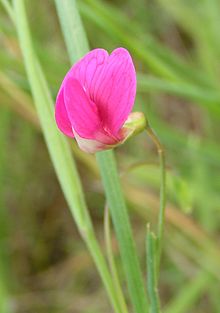Vetchling
| Lathyrus | |
|---|---|
 |
|
| Grass vetchling (Lathyrus nissolia) | |
| Scientific classification | |
| Kingdom: | Plantae |
| (unranked): | Angiosperms |
| (unranked): | Eudicots |
| (unranked): | Rosids |
| Order: | Fabales |
| Family: | Fabaceae |
| Subfamily: | Faboideae |
| Tribe: | Fabeae |
| Genus: |
Lathyrus L. |
| Species | |
|
See text. |
|
| Synonyms | |
|
|
See text.
Lathyrus /ˈlæθɪrəs/ (commonly known as peavines or vetchlings) is a genus in the legume family Fabaceae and contains approximately 160 species. They are native to temperate areas, with a breakdown of 52 species in Europe, 30 species in North America, 78 in Asia, 24 in tropical East Africa, and 24 in temperate South America. There are annual and perennial species which may be climbing or bushy. This genus has numerous sections, including Orobus, which was once a separate genus.
Many species are cultivated as garden plants. The genus includes the garden sweet pea (Lathyrus odoratus) and the perennial everlasting pea (Lathyrus latifolius). Flowers on these cultivated species may be rose, red, maroon, pink, white, yellow, purple or blue, and some are bicolored. They are also grown for their fragrance. Cultivated species are susceptible to fungal infections including downy and powdery mildew.
Other species are grown for food, including the Indian pea (L. sativus) and the red pea (L. cicera), and less commonly Cyprus-vetch (L. ochrus) and Spanish vetchling (L. clymenum). The tuberous pea (L. tuberosus) is grown as a root vegetable for its starchy edible tuber. The seeds of some Lathyrus species contain the toxic amino acid oxalyldiaminopropionic acid and if eaten in large quantities can cause lathyrism, a serious disease.
...
Wikipedia
